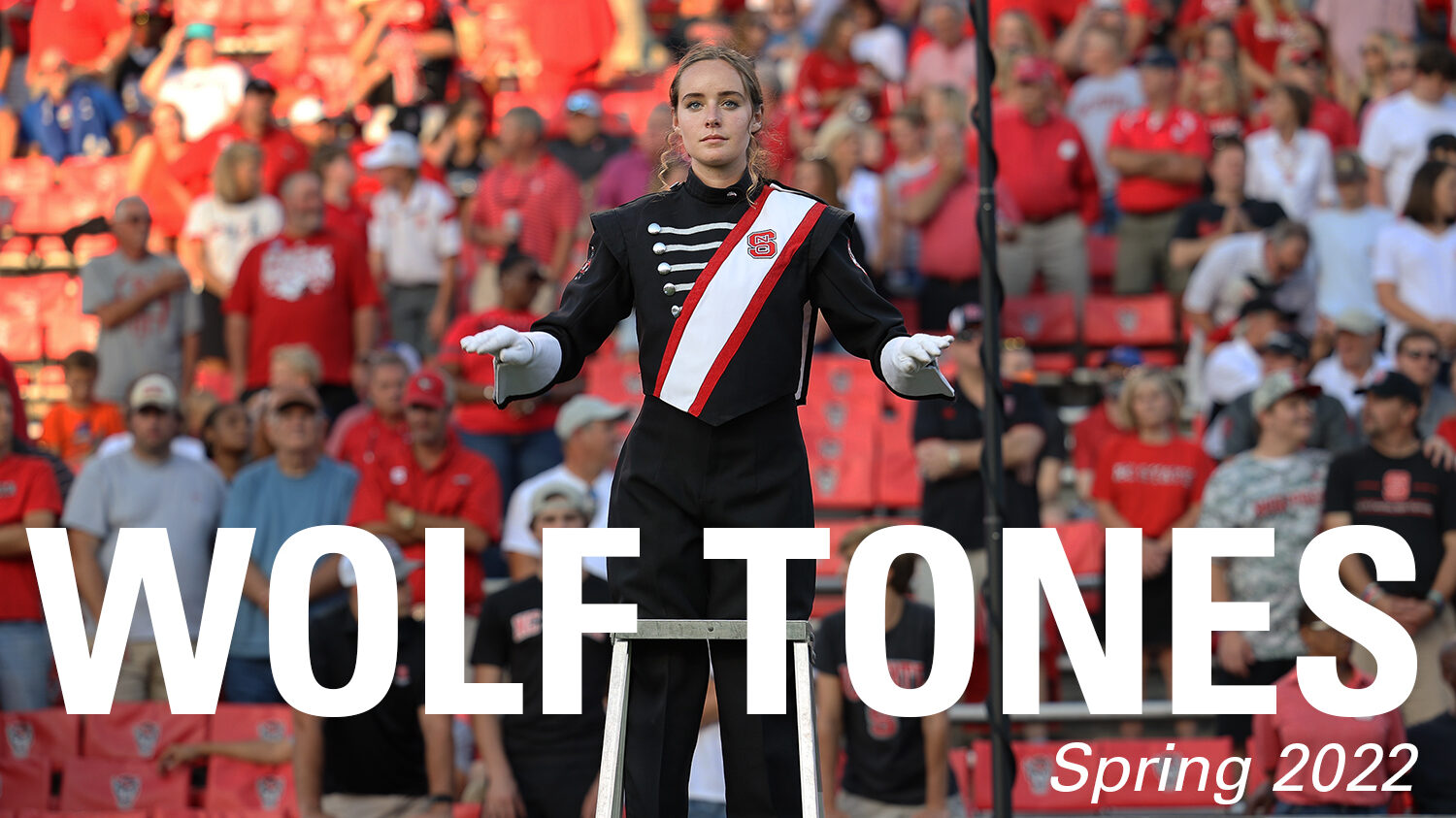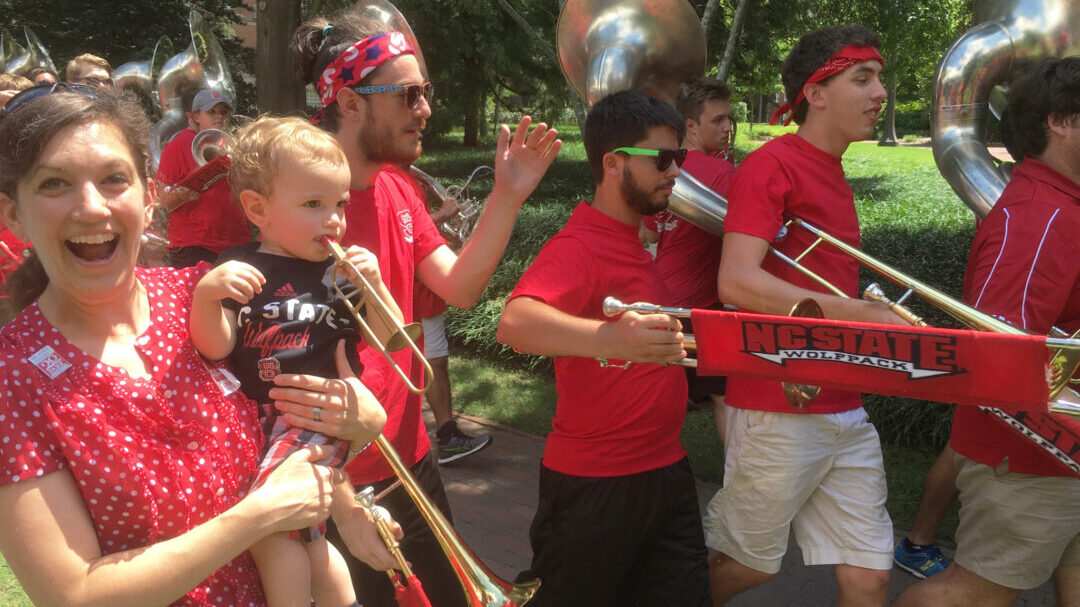Rising through the ranks
Music performance minors Laura Dugan and Samer Issa step into leadership roles with NC State ensembles and internationally recognized drum and bugle corps
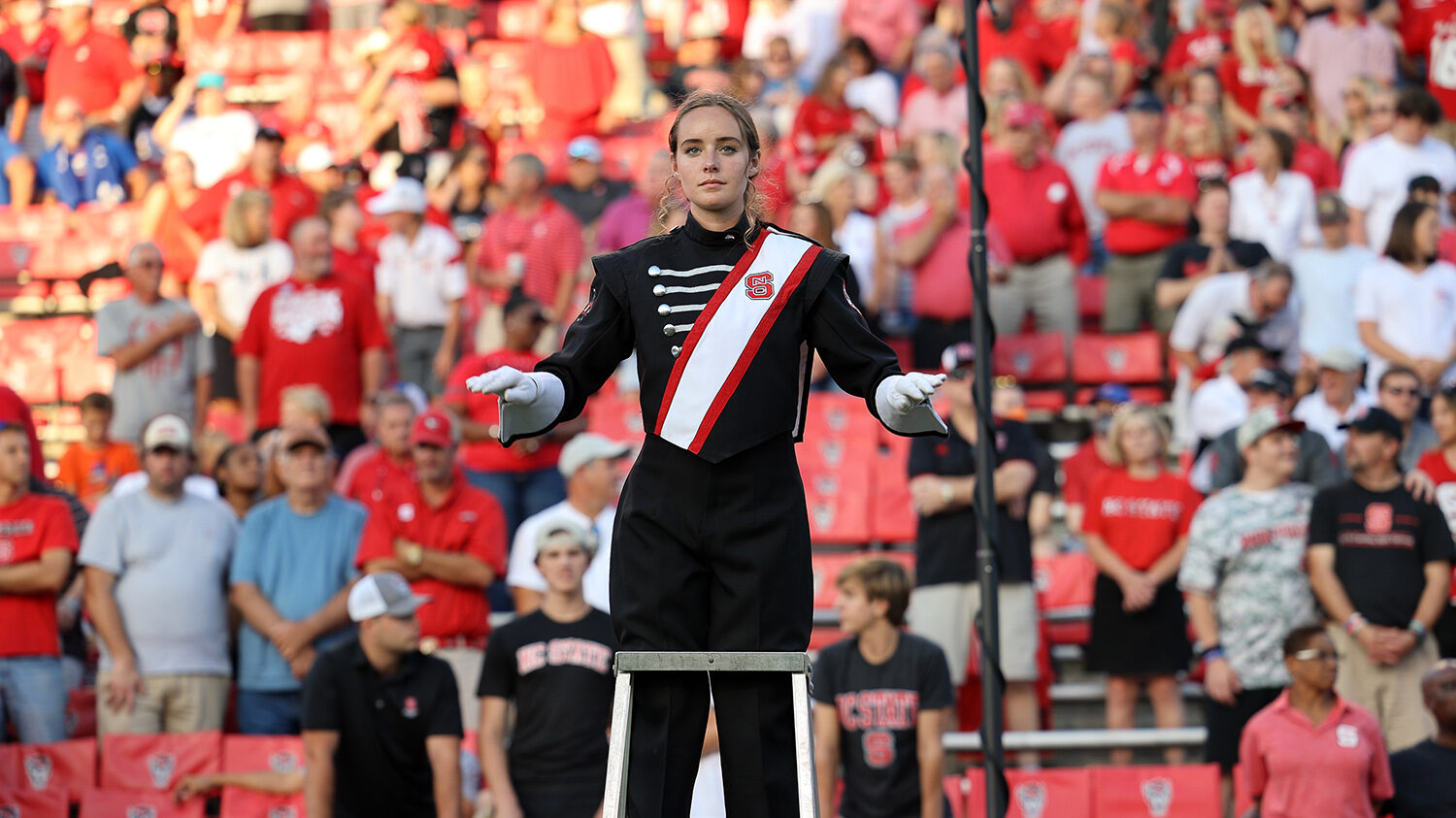
There are many ways to approach making music a part of your college experience. Some student-musicians find the creative outlet they need by enrolling in an ensemble or attending weekly meetings with a music-affiliated student organization. Others are driven to pursue a music or arts entrepreneurship minor and enroll in as many ensembles as will fit in their busy schedules. Music performance minors Laura Dugan and Samer Issa take the all-in approach a step further through their off-campus leadership roles with internationally recognized drum and bugle corps.
Boston Crusaders and the Power Sound of the South
Dugan, a sophomore studying biomedical engineering, currently serves as a drum major for both NC State’s Power Sound of the South marching band and Boston Crusaders, a drum and bugle corps based in Boston, Mass. The seasons do not overlap and the majority of her involvement with Boston Crusaders takes place over the summer, allowing her to balance it with her studies at NC State. In addition to her role with the Power Sound of the South, she currently plays the clarinet in the NC State wind ensemble, symphony and chamber orchestra.
“I want to take advantage of everything that NC State has to offer while I’m here,” Dugan said. Her philosophy extends beyond opportunities at NC State, and motivated Dugan to audition for a conductor position with Boston Crusaders, even though her hometown is Johnson City, Tennessee. When a rare opportunity opened up for people outside of the ranks of the corps to audition for a conductor role, she leapt at the chance.
“As a woodwind player, I normally wouldn’t be able to find a home in a drum corps because they don’t have woodwinds players. They only have brass, color guard and percussion,” said Dugan. “So I was super lucky to be able to kind of sneak my way in on the drum major track. I completed the audition there and they decided they wanted me on the team.”
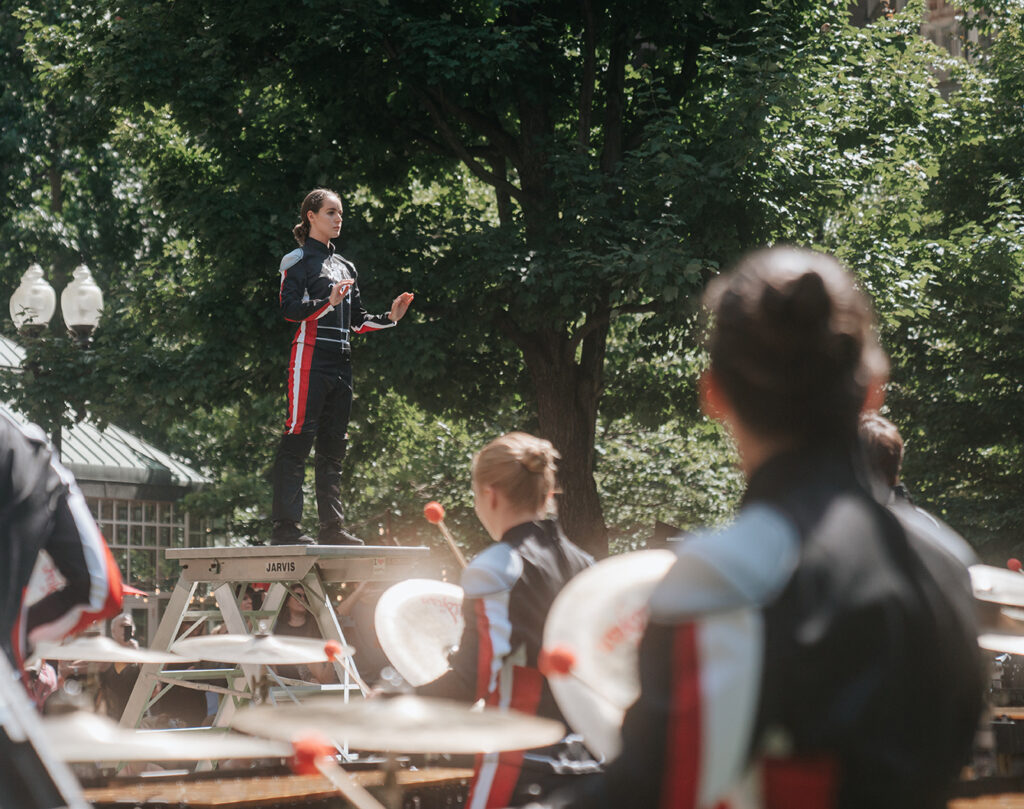
Modern drum and bugle corps began taking shape after World War I, established by veterans’ organizations or groups of parents who wanted their children to benefit from the rigorous instruction, discipline, pageantry and precision they observed in American military and parade units. Since the formation of Drum Corps International (DCI) in 1972, the activity has evolved into a contemporary art form and one of the largest youth programs in the United States. Members of drum corps typically spend summers training and traveling to competitions and exhibitions both nationally and internationally. It is not uncommon for corps members to come from out of state, like Dugan, or even from outside of the country.
Dugan considers her high school and NC State marching band experiences to be a large part of who she is, and that motivated her to look into joining a drum corps. “I owe a lot of my character to the things I’ve learned through the marching arts. I knew that I wanted to continue pursuing that at the highest level possible.”
She saw the opportunity to be a drum major for Boston Crusaders as an opportunity to learn from some of the world’s greatest teachers in the field of the marching arts, and an additional chance to serve as a drum major before she ages out of drum corps and collegiate programs.
“I think [being a drum major is] a really unique way to serve an organization, to kind of get to do a lot of the behind-the-scenes work,” she said. “Also it’s just an amazing opportunity to stand in front of any horn line, both at Boston [Crusaders] and here at NC State, and to get to see the big picture of the show and big picture of your group.”
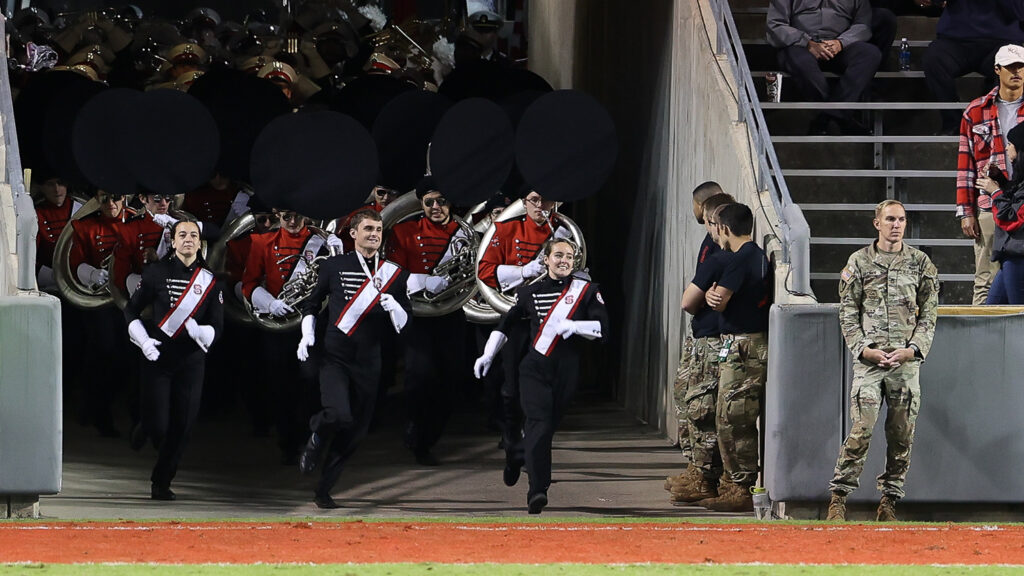
Dugan said being a drum major for Boston Crusaders is a very different experience from being a drum major for NC State, and both provide fun opportunities for growth, both musically and as a leader.
“I really, really enjoy being a drum major here at NC State…I think we have a lot of fun traditions that are more relaxed that I don’t get to have a lot of in my drum corps, because with its competitive nature things are very serious,” said Dugan. “I really like the more friendly and fun aspect to the band here at NC State, while also still getting to have a great musical experience.
“During drum corps, there’s no such thing as football for us and we’re mostly a competitive performing group. That’s a little bit different from NC State, but a lot of the core values and concepts that I’ve learned are applicable, not just in the marching band world but for all areas of life. It’s definitely taught me how to be very patient, very flexible and to think quickly on my feet. It’s also really taught me a lot about the importance of making one on one relationships with people and how that can strengthen your group and your team. And I also think that the level of education, and music, and athletic, visual sides of things that I receive at Boston has helped me bring some of that to NC State and have a better understanding of the stuff we do here.”
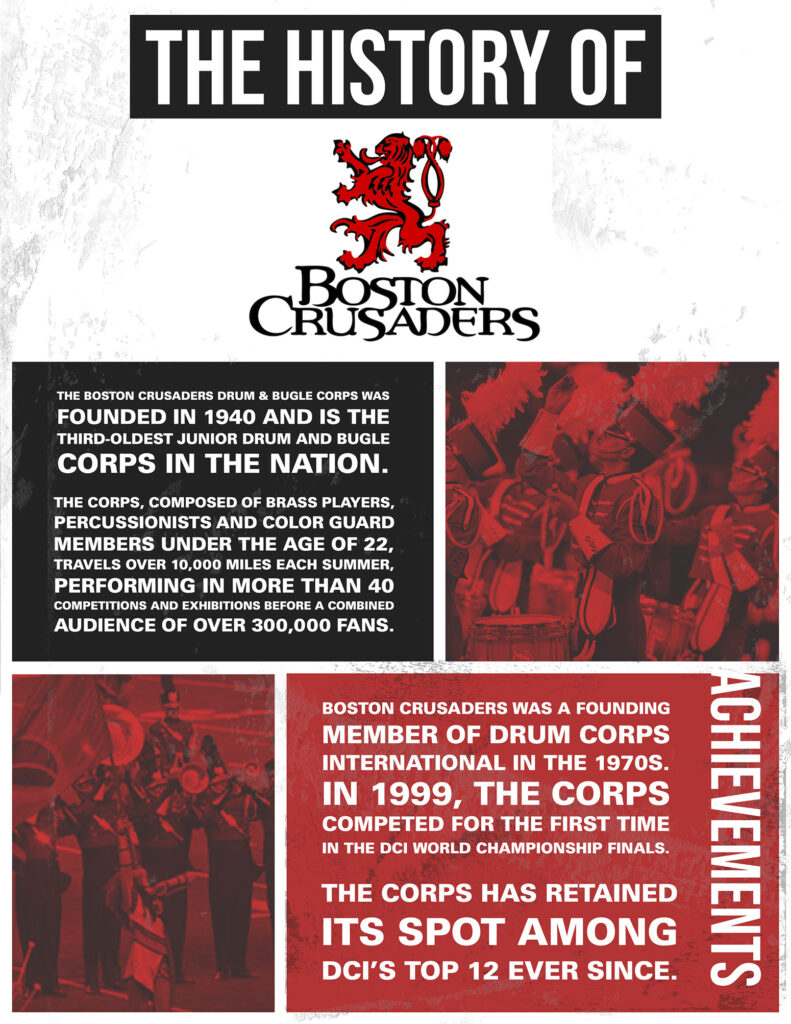
Carolina Crown
The competition focus with DCI programs is one of the key factors that differentiates the experience from marching with the Power Sound of the South. For Issa, a senior majoring in human biology, this was what drew him to join Carolina Crown, based in Fort Mill, South Carolina. Unlike Dugan, Issa does not march for NC State, but he plays the trombone in the wind ensemble and the brass quintet and has performed with the NC State orchestras and in pit orchestras for University Theatre. He also volunteers as a music department ambassador, supporting the department’s Day of Giving activities and helping to build a community for NC State student-musicians.
Issa was introduced to Carolina Crown when his high school band attended their annual NightBEAT show at Wake Forest University. A couple years later, he attended a clinic and an audition camp and was hooked. After several years of performing with the group, he became the baritone section leader in 2021, and then was selected for the role of horn sergeant for 2022, leading the entire brass line of the corps and serving as a liaison between the staff and the brass players.
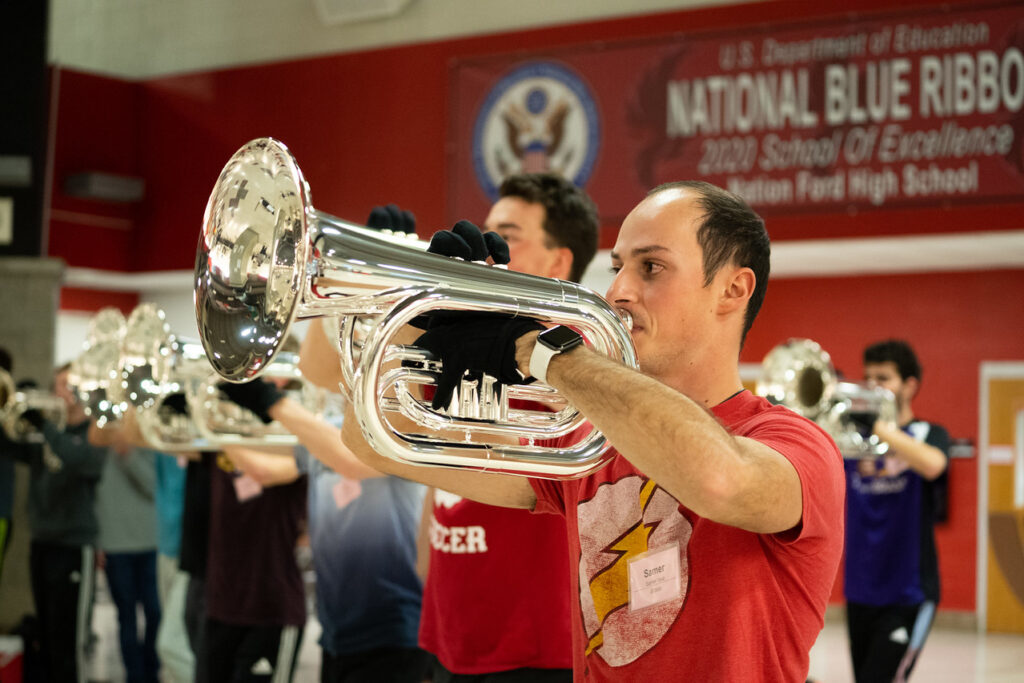
“I have to make sure that we’re constantly ready, because we’re very detailed,” he said. “There are some things that people might look [at from] the outside like, ‘Wow, do they really spend the time doing that?’ Yes, it’s important to us. It’s a lot of work, there’s a lot of extra stuff that I do on the side. But for me it’s worth it because I get to lead what is considered probably the best horn line in the country.”
Issa enjoys the intense training and focus that the corps requires. Each summer, members converge at Gardner Webb University for four-to-five-week training camps, working from 9:00 a.m. often until 11:00 p.m. to get their programs ready for competitions.
“Basically we’re learning the show, putting it all together and, honestly, just getting stronger,” he said. “That’s one of the hardest things is—no matter how much you prepare for it physically—it’s a slog. You’re doing it every day and there’s really nothing like it other than maybe military boot camp because of how rigorous it is.”
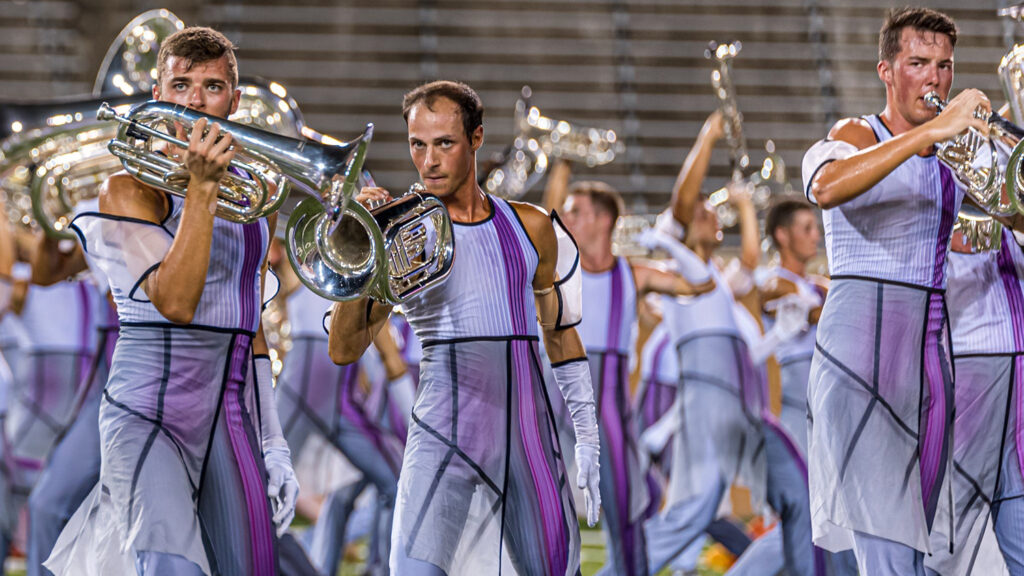
In a typical season, the corps might compete in 20 to 30 different competitions, in addition to performing in exhibitions and hosting clinics, so it’s important that they perfect their program as much as possible during camp. To keep everyone accountable for preparing and learning their part, they also hold monthly camps on weekends and give members weekly video assignments.
“I find myself really getting a lot out of it, because you spend three months on developing a really tightly knit, well-performed show, and that takes a lot of really strong work ethic and dedication, especially to push through what is probably three months of, for a lot of people, some of the hardest stuff they do in their lives,” said Issa. “It’s very, very taxing.”
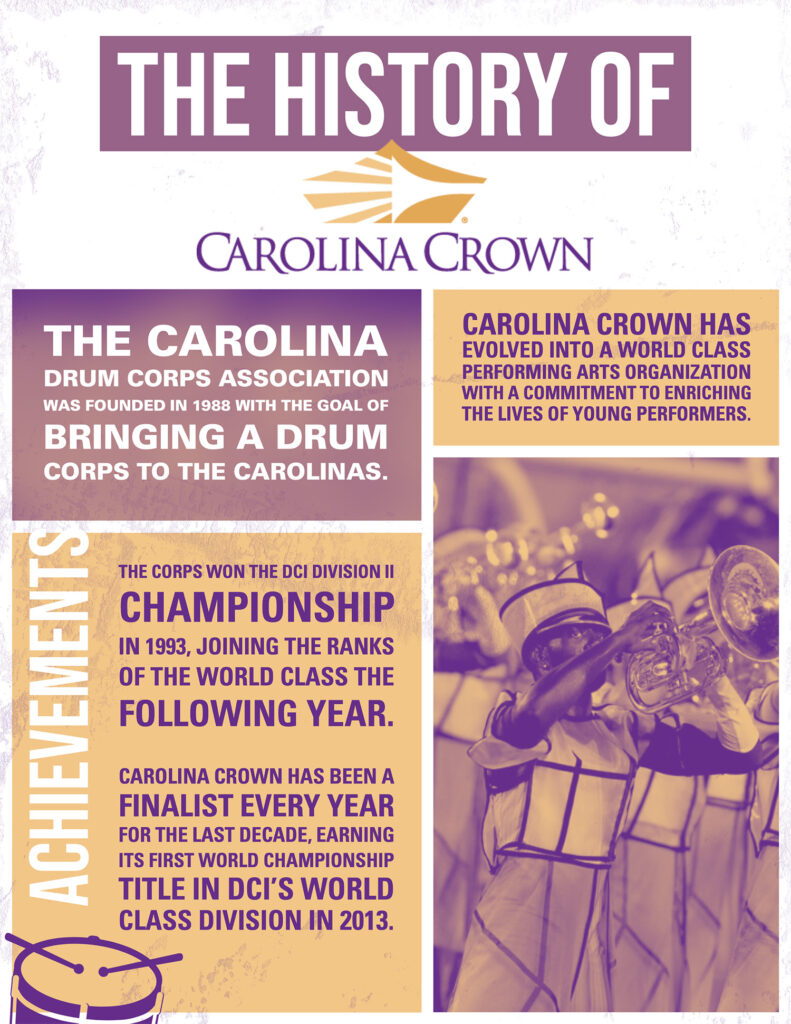
Paying it forward
Issa has seen the results of his involvement in Carolina Crown manifest in his academic habits, his performance with his Department of Music ensembles and his teaching role with the marching band programs at Green Level High School and Green Hope High School in Cary, where he helps out with the wind sections and marching techniques.
“The thing that I love about [Carolina Crown] is their mission statement is ‘Developing lifelong excellence in young people,’” he said. “I think it’s definitely changed my work ethic and my approach to school, especially. Seeing the people that do it—especially those that are leadership or vets of the corps—who’ve been around for a while, just to see how much work they’re putting in really has pushed me to be not just a better performer, but a better student and just a better leader in general. So I try to instill that same level of excellence in the kids I teach. I think they’re definitely achieving that mission statement for a lot of people.”
Both Issa and Dugan have found opportunities to share their passion for the marching arts with younger students through teaching roles with local high school bands. Dugan is serving as a visual tech at Cary High School, a role that she hopes to continue there or elsewhere after college. She said that both her experience with Boston Crusaders and her experience at NC State are preparing her to contribute to high school band programs.
“Drum corps is really pushing the frontiers of the marching arts, so being able to see some of that stuff as it comes out firsthand and bring it to your high school is a really valuable thing for their programs…the same thing goes for NC State,” Dugan said. “They’re really excited to see that I’m still really heavily involved in music and still constantly learning. Even though I’m not a music major, I’m still getting a very well-rounded education in music here at NC State, and that is definitely something that’s valuable to being able to play in ensembles later, with my performance minor, and then also teach in some ensembles later too.”
The music department strives to give its student-musicians a foundation for lifelong music-making, and Issa and Dugan have already found outlets for theirs, leading a new generation of student-musicians to find their own passion for the marching arts.
- Categories:
